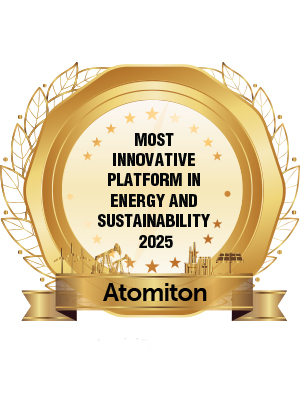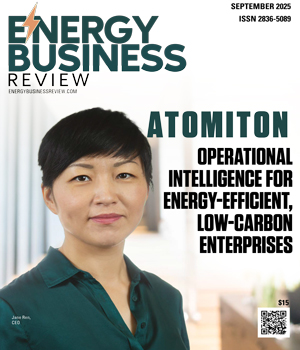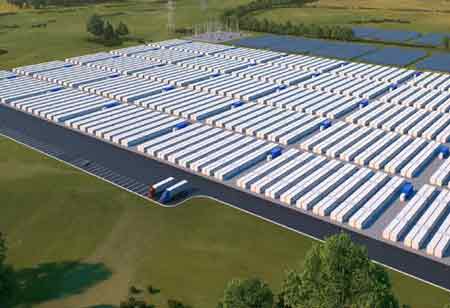Thank you for Subscribing to Energy Business Review Weekly Brief
Enterprises today are under pressure to control costs while meeting sustainability targets. Most traditional systems fail to address both needs. Energy management tools often provide a narrow view of electricity usage, overlooking emissions from water, fuel, and supply chains. Meanwhile, ESG reporting software offers high-level summaries but delivers little actionable insight for plant managers, engineers, or executives striving to drive real change. Fragmentation across systems and locations leaves organizations with scattered and delayed data. That breakdown in visibility and control is exactly what Atomiton was designed to address. It tackles fragmentation through a unified, real-time platform that connects operational activity with resource consumption and environmental impact. The technology integrates data on energy, water, carbon, and assets into a system that reflects how businesses operate—across facilities, key processes, and assets. It provides clients with the visibility and insights needed to embed resource efficiency and sustainability into everyday decisions. At the core of Atomiton’s offering is its immersive intelligence platform. Rooted in the company’s expertise in real-time operational data, the platform reveals how resource use and environmental impact align with day-to-day business activities. It enables organizations to see the full picture by linking inputs like energy and water with outputs such as carbon emissions and waste, in the context of operational parameters. This empowers teams to identify the best ways to reduce costs while meeting sustainability goals with clarity and precision. The platform features modular building blocks called “BOTs” (Business Operations Templates), which represent processes that consume or emit key resources such as electricity, fuel, and water. These BOTs feed into a hybrid reasoning engine that combines deterministic logic with generative AI to deliver intelligent recommendations at scale. A dynamic dashboard presents real-time metrics, enabling companies to identify inefficiencies, receive actionable suggestions, and forecast the impact of strategic decisions. Whether determining which process consumes the most energy or projecting how a shift to renewables might affect emissions, the platform transforms complex data into clear, actionable insights. “What businesses gain from using our platform is the ability to reduce energy costs, uncover efficiency opportunities, and make measurable progress toward their carbon emissions and sustainability targets,” says Jane Ren, CEO.
Top Electricity And Natural Gas Service 2025
While deregulated energy markets give businesses the power to choose their electricity and natural gas suppliers, often with better rates and flexible terms, many small and medium-sized businesses remain unaware this option even exists. For those who are aware, navigating the process can be complex and time-consuming, often leading to missed cost savings and overlooked optimization strategies. Elite Energy Solutions flips that script. Built on a transparency-first model, Elite helps businesses understand the financial impact of their energy choices. It educates clients on the structure of their bills, the range of supplier options available and how to align energy strategy with operational goals. At the core is proprietary software that delivers custom pricing in as little as 24 hours, a sharp contrast to the industry norm of weeks. With an exceptional client retention rate and measurable savings across sectors, from industrial manufacturers to large facilities to local small businesses, Elite has redefined what it means to be a broker in today’s energy market. It doesn’t just quote rates but manages strategy, relationships and outcomes, turning what was once a confusing utility bill into a well-leveraged business asset. “We’ve fully integrated consulting into our core brokerage activities. Our job is to make energy strategy clear, actionable and aligned with each client’s bottom line. That clarity builds trust, turning clients into long-term partners,” says Thomas Colby, president. Each engagement begins with a full audit of usage patterns, historical load, billing structure and contract timelines. This data is processed through Elite’s proprietary pricing platform, transforming complex energy profiles into clean, structured proposal requests. Elite’s process consolidates the hidden cost factors that traditionally complicate energy pricing, such as peak demand penalties, grid capacity fees, transmission costs and usage pattern variations, into a format suppliers can quickly evaluate. By eliminating the traditional back-and-forth of pricing negotiations, its platform delivers comprehensive, side-by-side pricing on all available options, often within 24 hours. The result is clarity replacing confusion, speed replacing delays and genuine cost savings where profit-driven suppliers once held the advantage..
Organic Biomass Waste Solution
Climate change is undoubtedly the most significant concern humanity faces today, and it is our responsibility to take the edge off the carbon footprint stamping down on the environment. An alternative fuel promises a viable and sustainable solution for rectifying this man-made damage to the Earth—a much-needed action to save its resources for the upcoming generations. A prominent agricultural technology company, BioProducts, LLC is at the forefront of navigating this indispensable shift from conventional to alternative fuel. It specializes in developing alternative fuels and other value-added products from sustainable biomass, advocating environmental integrity and sustainability beyond borders. “In the expanse of our forest and agricultural lands, colossal amounts of residues are left behind; branches, corn stover, sugarcane bagasse, and stillage from distilleries hold immense potential as renewable energy sources. However, they often remain underutilized due to the lack of means to collect, transport and process them, leading to environmental degradation or even forest fire,” says Dr. Jagannadh Satyavolu, founder and CEO, BioProducts. BioProducts is an innovator in the niche, ideally positioned to tap into this hidden treasure and work toward a common goal—transforming biomass into useful products. The company holds a range of patents, licensed from the University of Louisville, designed to transform the discarded biomass in forests and agricultural fields into value-added products. Its patented technologies, coupled with other cutting-edge technologies, allow for processing biomass in environmentally conscious and economically advantageous manners.
CXO INSIGHTS

Navigating the Tides of Change in the Natural Gas Industry
Mark Reese, Vice President, U.S. Natural Gas Supply, Just Energy

Championing Strategic Leadership in Water and Forest Sustainability
Elvy Barton, Water and Forest Sustainability Senior Manager, Salt River Project

Redefining Standards Of The Electricity Paradigm
John Stephens, Director-Power System Control/Planning, City Utilities of Springfield

The Role Of Compensated Fuels In A Balanced Energy Transition
Jonathan (J.W.) Hackett, Senior Director, Environmental Products, Global Partners LP

Navigating Complexity in Gas Utility Construction, Strengthening Risk Mitigation
Awet Haddis, P.Eng., PMP, ENV SP, Senior Project Manager, Puget Sound Energy
IN FOCUS
The Rise of Platform Utilities: Enabling a Multi-Directional Energy Market
Utilities are evolving into central players in a decarbonized energy ecosystem, focusing on grid modernization, renewable energy investments, and customer-centric services by 2030.
Platform Strategies Driving the EV Charging Revolution
The electric vehicle charging ecosystem is evolving, integrating mobility and energy management to create smarter, sustainable cities through advanced platforms and technologies.
EDITORIAL
Innovation Driving a Resilient Energy Future
Emerging tech trends, from digital grid intelligence and predictive analytics to renewable integration and carbon-reduction platforms, are allowing service providers to merge operational excellence with environmental responsibility. Traditional utilities are no longer just suppliers; they are evolving into partners in innovation, enabling businesses and communities to operate more efficiently while advancing their sustainability goals. This alignment of dependable service with cutting-edge technology is shaping an energy model defined by long-term resilience and ecological impact.
Bringing together the leaders in essential energy services and the innovators shaping tomorrow’s clean-energy platforms reflects the industry’s new trajectory. It is a story of balance, where continuity meets change, and where the technologies of the future work hand in hand with the services that keep the world running today.
This edition of Energy Business Review explores that transformation, spotlighting the strategies and perspectives that are redefining the future of energy.
Featured thought leaders include Jonathan Berry, M.S., utility scale development manager at RWE. He highlights that Colorado’s solar and battery storage industry faces complex mid- to late-stage hurdles—permitting, interconnection rules, community opposition and equipment delays, that demand proactive strategies for project success. Stephen Branscum, senior energy manager at Walmart, emphasizes that the future growth and safety of commercial solar in the U.S. depends on shifting O&M from a reactive checklist approach to a proactive, collaborative partnership that prevents risks and builds trust.
We hope this edition provides fresh insights into how innovation and collaboration can strengthen the energy sector and accelerate its transition toward a resilient and responsible future.










